Analysis: COVID-19 Impact and Strategies for Higher Education
VerifiedAdded on 2023/01/10
|7
|2026
|95
Report
AI Summary
This report analyzes the profound impact of the COVID-19 pandemic on the higher education sector, specifically within the UK. It explores the significant disruptions caused by the pandemic, including the shift to online learning, challenges in student recruitment and retention, and the economic consequences of decreased tuition fees and student enrollment. The report examines various perspectives from researchers and articles, highlighting the positive and negative aspects of the pandemic's impact on student performance and the implementation of digital technologies. Furthermore, it discusses alternative strategies such as digital technology and e-learning to overcome the challenges. This report concludes that while the pandemic has brought many adversities, it has also accelerated the adoption of digital technologies and online learning, offering a crucial pathway for universities and colleges to continue providing education and support to students. Students can access this and other reports on Desklib for further study and understanding.
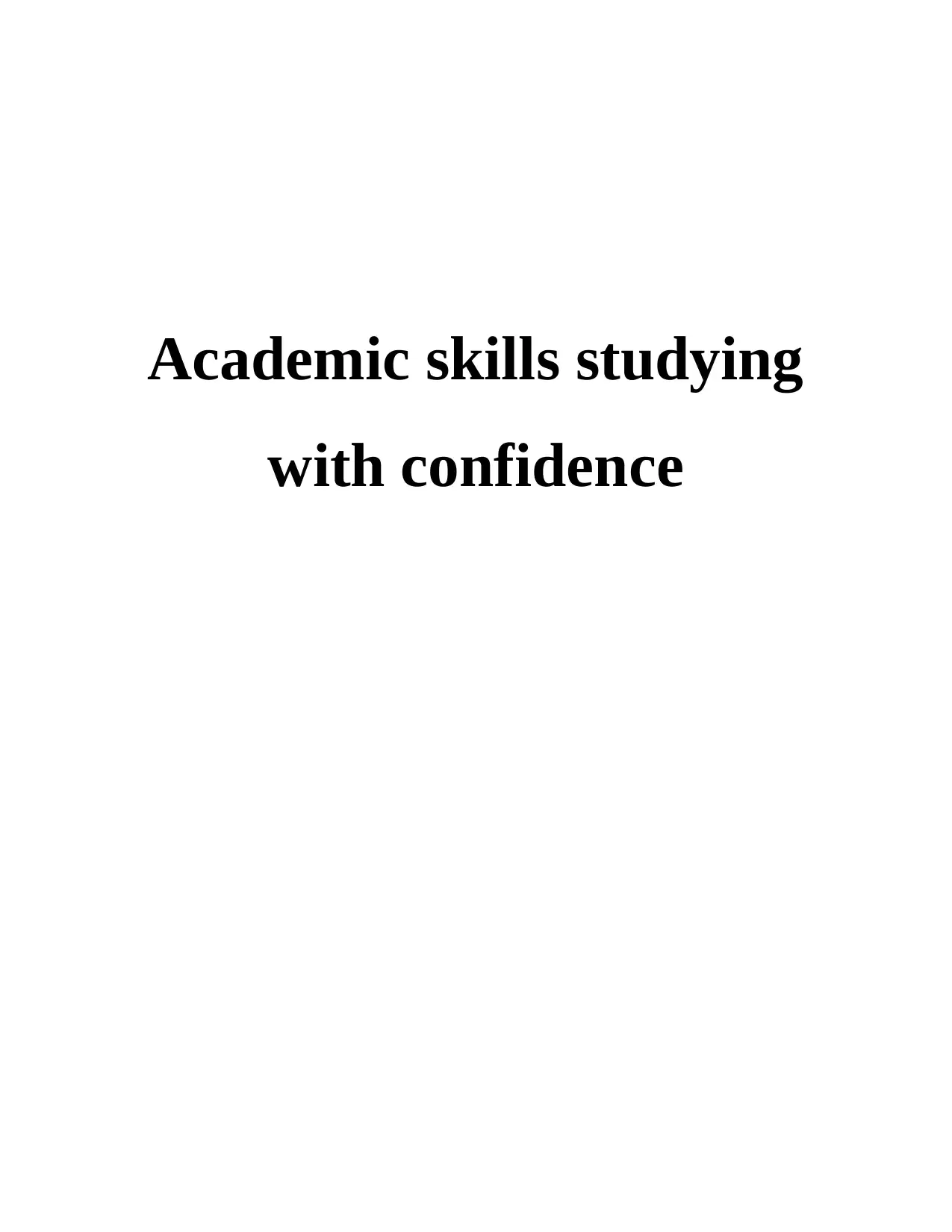
Academic skills studying
with confidence
with confidence
Paraphrase This Document
Need a fresh take? Get an instant paraphrase of this document with our AI Paraphraser
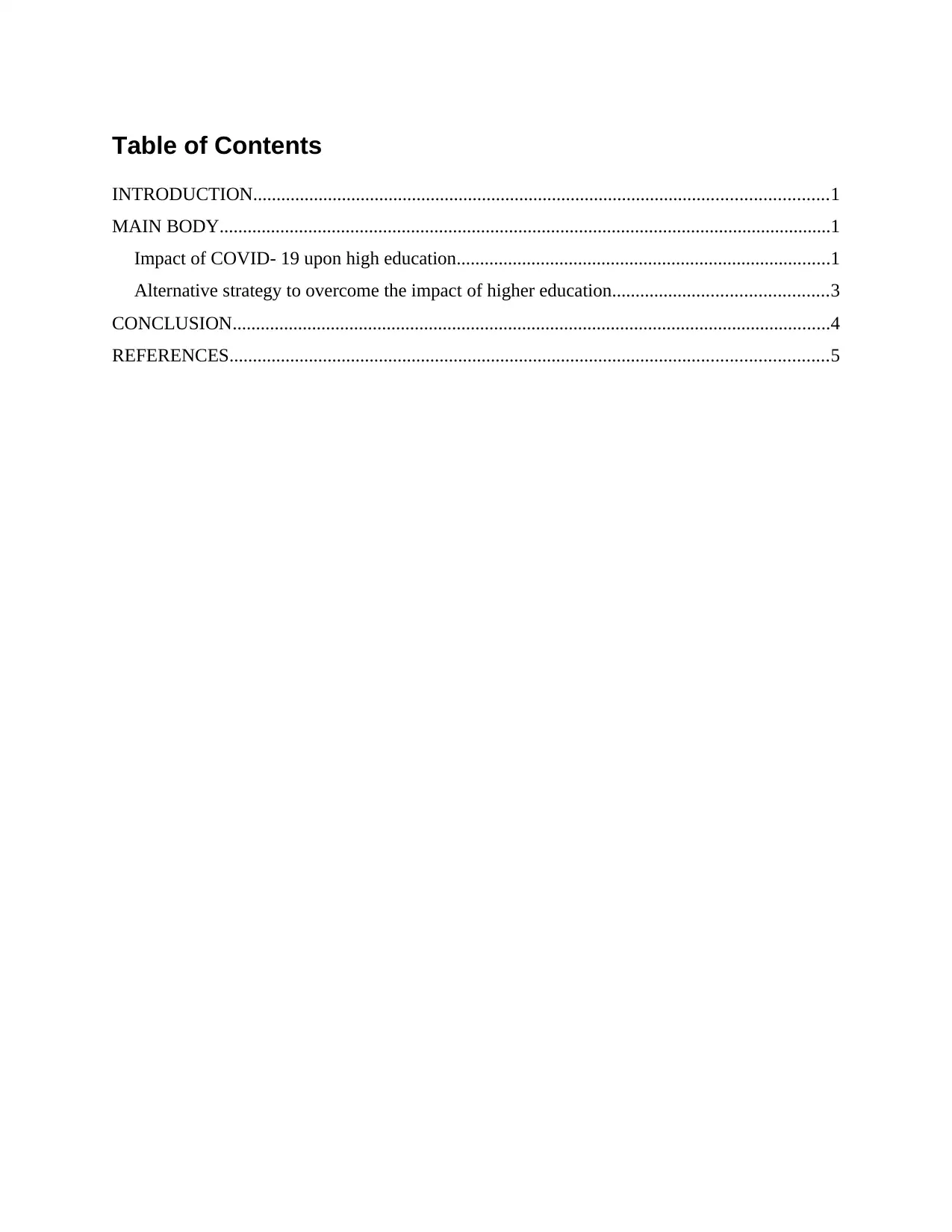
Table of Contents
INTRODUCTION...........................................................................................................................1
MAIN BODY...................................................................................................................................1
Impact of COVID- 19 upon high education................................................................................1
Alternative strategy to overcome the impact of higher education..............................................3
CONCLUSION................................................................................................................................4
REFERENCES................................................................................................................................5
INTRODUCTION...........................................................................................................................1
MAIN BODY...................................................................................................................................1
Impact of COVID- 19 upon high education................................................................................1
Alternative strategy to overcome the impact of higher education..............................................3
CONCLUSION................................................................................................................................4
REFERENCES................................................................................................................................5
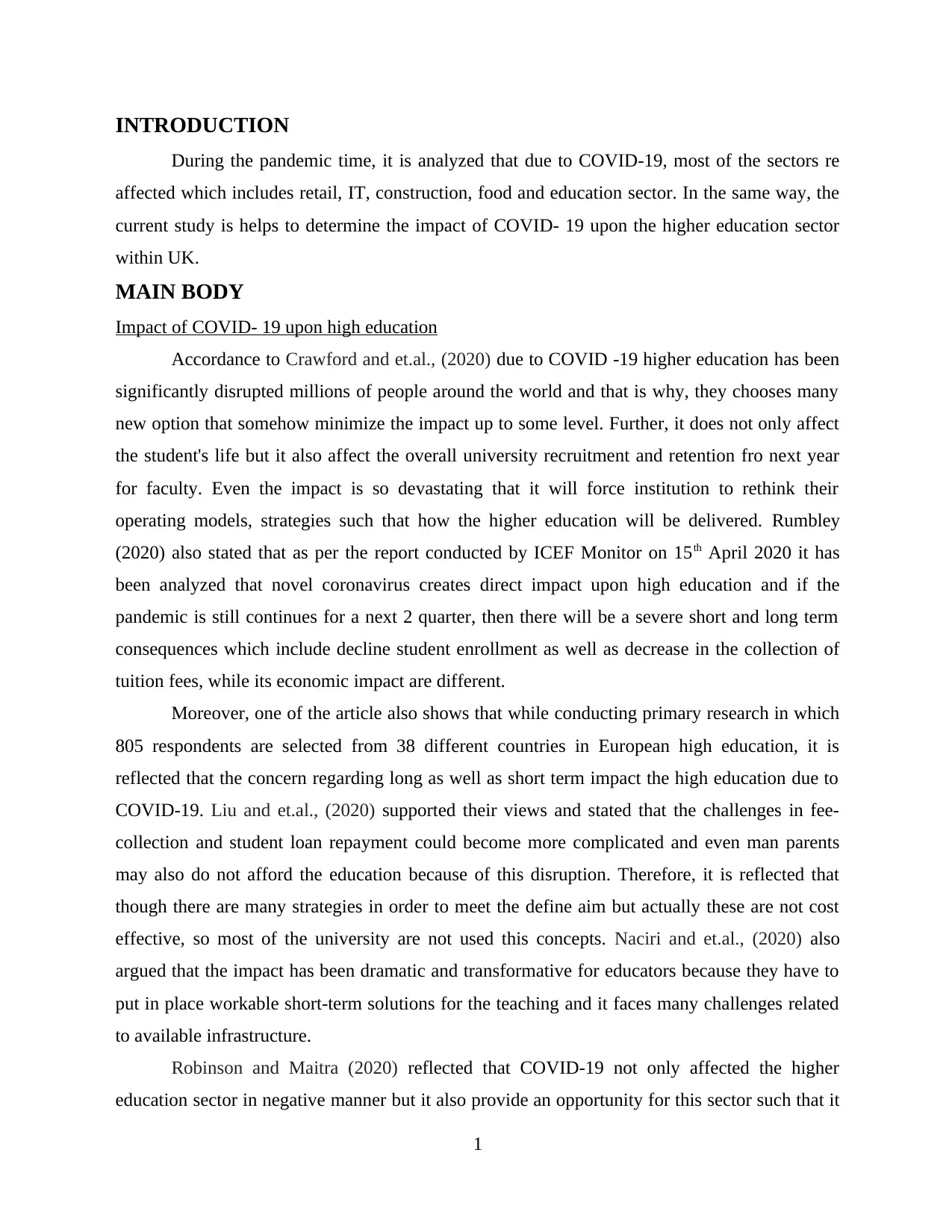
INTRODUCTION
During the pandemic time, it is analyzed that due to COVID-19, most of the sectors re
affected which includes retail, IT, construction, food and education sector. In the same way, the
current study is helps to determine the impact of COVID- 19 upon the higher education sector
within UK.
MAIN BODY
Impact of COVID- 19 upon high education
Accordance to Crawford and et.al., (2020) due to COVID -19 higher education has been
significantly disrupted millions of people around the world and that is why, they chooses many
new option that somehow minimize the impact up to some level. Further, it does not only affect
the student's life but it also affect the overall university recruitment and retention fro next year
for faculty. Even the impact is so devastating that it will force institution to rethink their
operating models, strategies such that how the higher education will be delivered. Rumbley
(2020) also stated that as per the report conducted by ICEF Monitor on 15th April 2020 it has
been analyzed that novel coronavirus creates direct impact upon high education and if the
pandemic is still continues for a next 2 quarter, then there will be a severe short and long term
consequences which include decline student enrollment as well as decrease in the collection of
tuition fees, while its economic impact are different.
Moreover, one of the article also shows that while conducting primary research in which
805 respondents are selected from 38 different countries in European high education, it is
reflected that the concern regarding long as well as short term impact the high education due to
COVID-19. Liu and et.al., (2020) supported their views and stated that the challenges in fee-
collection and student loan repayment could become more complicated and even man parents
may also do not afford the education because of this disruption. Therefore, it is reflected that
though there are many strategies in order to meet the define aim but actually these are not cost
effective, so most of the university are not used this concepts. Naciri and et.al., (2020) also
argued that the impact has been dramatic and transformative for educators because they have to
put in place workable short-term solutions for the teaching and it faces many challenges related
to available infrastructure.
Robinson and Maitra (2020) reflected that COVID-19 not only affected the higher
education sector in negative manner but it also provide an opportunity for this sector such that it
1
During the pandemic time, it is analyzed that due to COVID-19, most of the sectors re
affected which includes retail, IT, construction, food and education sector. In the same way, the
current study is helps to determine the impact of COVID- 19 upon the higher education sector
within UK.
MAIN BODY
Impact of COVID- 19 upon high education
Accordance to Crawford and et.al., (2020) due to COVID -19 higher education has been
significantly disrupted millions of people around the world and that is why, they chooses many
new option that somehow minimize the impact up to some level. Further, it does not only affect
the student's life but it also affect the overall university recruitment and retention fro next year
for faculty. Even the impact is so devastating that it will force institution to rethink their
operating models, strategies such that how the higher education will be delivered. Rumbley
(2020) also stated that as per the report conducted by ICEF Monitor on 15th April 2020 it has
been analyzed that novel coronavirus creates direct impact upon high education and if the
pandemic is still continues for a next 2 quarter, then there will be a severe short and long term
consequences which include decline student enrollment as well as decrease in the collection of
tuition fees, while its economic impact are different.
Moreover, one of the article also shows that while conducting primary research in which
805 respondents are selected from 38 different countries in European high education, it is
reflected that the concern regarding long as well as short term impact the high education due to
COVID-19. Liu and et.al., (2020) supported their views and stated that the challenges in fee-
collection and student loan repayment could become more complicated and even man parents
may also do not afford the education because of this disruption. Therefore, it is reflected that
though there are many strategies in order to meet the define aim but actually these are not cost
effective, so most of the university are not used this concepts. Naciri and et.al., (2020) also
argued that the impact has been dramatic and transformative for educators because they have to
put in place workable short-term solutions for the teaching and it faces many challenges related
to available infrastructure.
Robinson and Maitra (2020) reflected that COVID-19 not only affected the higher
education sector in negative manner but it also provide an opportunity for this sector such that it
1
⊘ This is a preview!⊘
Do you want full access?
Subscribe today to unlock all pages.

Trusted by 1+ million students worldwide
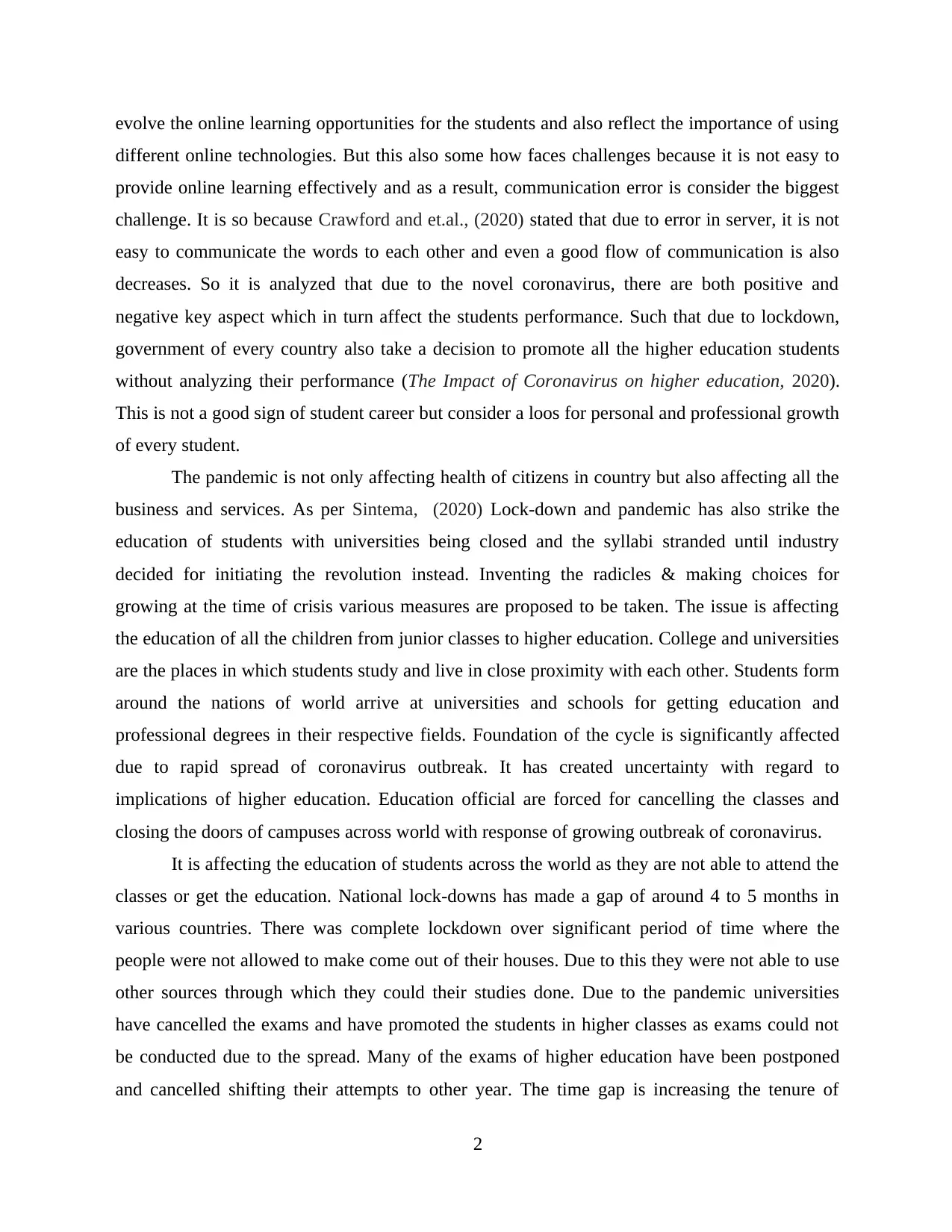
evolve the online learning opportunities for the students and also reflect the importance of using
different online technologies. But this also some how faces challenges because it is not easy to
provide online learning effectively and as a result, communication error is consider the biggest
challenge. It is so because Crawford and et.al., (2020) stated that due to error in server, it is not
easy to communicate the words to each other and even a good flow of communication is also
decreases. So it is analyzed that due to the novel coronavirus, there are both positive and
negative key aspect which in turn affect the students performance. Such that due to lockdown,
government of every country also take a decision to promote all the higher education students
without analyzing their performance (The Impact of Coronavirus on higher education, 2020).
This is not a good sign of student career but consider a loos for personal and professional growth
of every student.
The pandemic is not only affecting health of citizens in country but also affecting all the
business and services. As per Sintema, (2020) Lock-down and pandemic has also strike the
education of students with universities being closed and the syllabi stranded until industry
decided for initiating the revolution instead. Inventing the radicles & making choices for
growing at the time of crisis various measures are proposed to be taken. The issue is affecting
the education of all the children from junior classes to higher education. College and universities
are the places in which students study and live in close proximity with each other. Students form
around the nations of world arrive at universities and schools for getting education and
professional degrees in their respective fields. Foundation of the cycle is significantly affected
due to rapid spread of coronavirus outbreak. It has created uncertainty with regard to
implications of higher education. Education official are forced for cancelling the classes and
closing the doors of campuses across world with response of growing outbreak of coronavirus.
It is affecting the education of students across the world as they are not able to attend the
classes or get the education. National lock-downs has made a gap of around 4 to 5 months in
various countries. There was complete lockdown over significant period of time where the
people were not allowed to make come out of their houses. Due to this they were not able to use
other sources through which they could their studies done. Due to the pandemic universities
have cancelled the exams and have promoted the students in higher classes as exams could not
be conducted due to the spread. Many of the exams of higher education have been postponed
and cancelled shifting their attempts to other year. The time gap is increasing the tenure of
2
different online technologies. But this also some how faces challenges because it is not easy to
provide online learning effectively and as a result, communication error is consider the biggest
challenge. It is so because Crawford and et.al., (2020) stated that due to error in server, it is not
easy to communicate the words to each other and even a good flow of communication is also
decreases. So it is analyzed that due to the novel coronavirus, there are both positive and
negative key aspect which in turn affect the students performance. Such that due to lockdown,
government of every country also take a decision to promote all the higher education students
without analyzing their performance (The Impact of Coronavirus on higher education, 2020).
This is not a good sign of student career but consider a loos for personal and professional growth
of every student.
The pandemic is not only affecting health of citizens in country but also affecting all the
business and services. As per Sintema, (2020) Lock-down and pandemic has also strike the
education of students with universities being closed and the syllabi stranded until industry
decided for initiating the revolution instead. Inventing the radicles & making choices for
growing at the time of crisis various measures are proposed to be taken. The issue is affecting
the education of all the children from junior classes to higher education. College and universities
are the places in which students study and live in close proximity with each other. Students form
around the nations of world arrive at universities and schools for getting education and
professional degrees in their respective fields. Foundation of the cycle is significantly affected
due to rapid spread of coronavirus outbreak. It has created uncertainty with regard to
implications of higher education. Education official are forced for cancelling the classes and
closing the doors of campuses across world with response of growing outbreak of coronavirus.
It is affecting the education of students across the world as they are not able to attend the
classes or get the education. National lock-downs has made a gap of around 4 to 5 months in
various countries. There was complete lockdown over significant period of time where the
people were not allowed to make come out of their houses. Due to this they were not able to use
other sources through which they could their studies done. Due to the pandemic universities
have cancelled the exams and have promoted the students in higher classes as exams could not
be conducted due to the spread. Many of the exams of higher education have been postponed
and cancelled shifting their attempts to other year. The time gap is increasing the tenure of
2
Paraphrase This Document
Need a fresh take? Get an instant paraphrase of this document with our AI Paraphraser
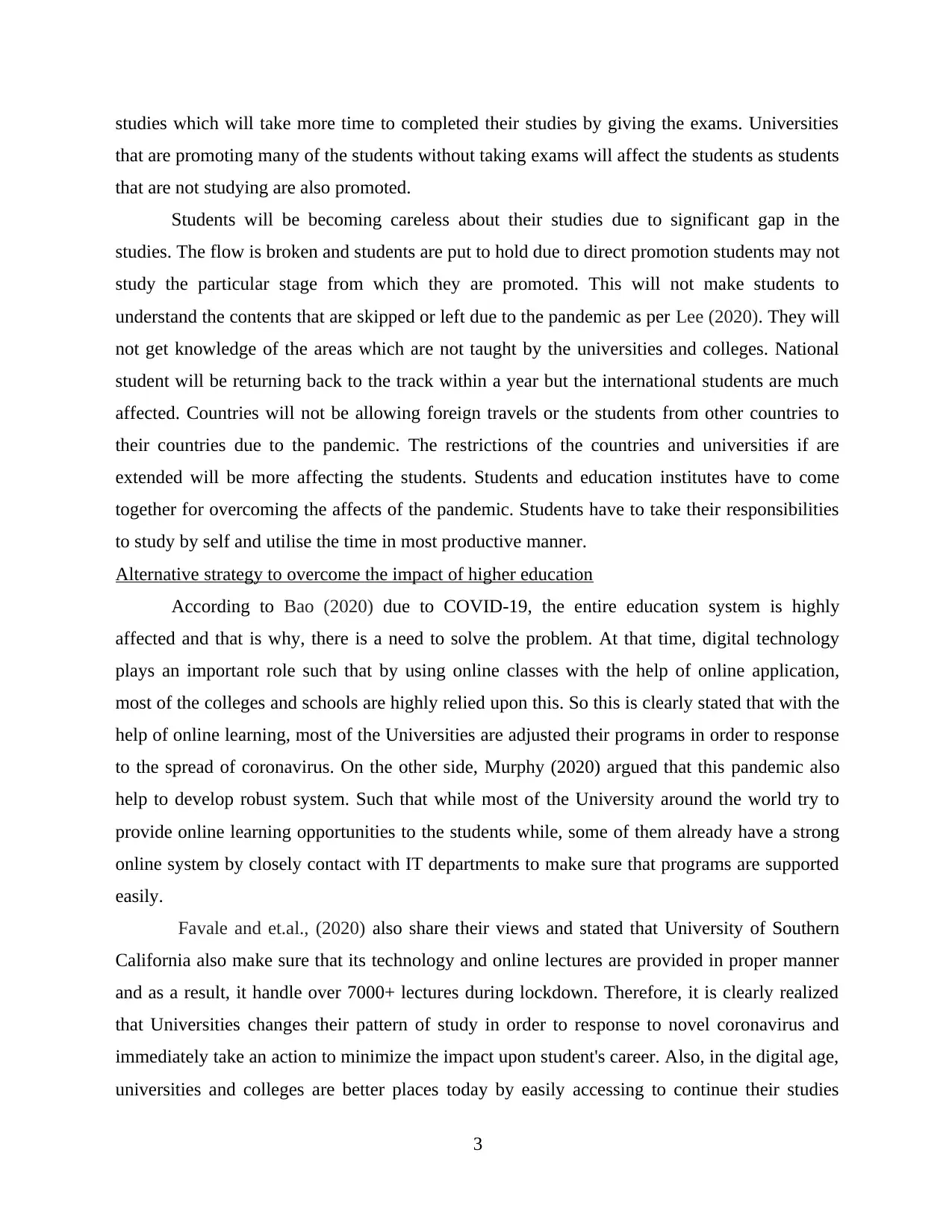
studies which will take more time to completed their studies by giving the exams. Universities
that are promoting many of the students without taking exams will affect the students as students
that are not studying are also promoted.
Students will be becoming careless about their studies due to significant gap in the
studies. The flow is broken and students are put to hold due to direct promotion students may not
study the particular stage from which they are promoted. This will not make students to
understand the contents that are skipped or left due to the pandemic as per Lee (2020). They will
not get knowledge of the areas which are not taught by the universities and colleges. National
student will be returning back to the track within a year but the international students are much
affected. Countries will not be allowing foreign travels or the students from other countries to
their countries due to the pandemic. The restrictions of the countries and universities if are
extended will be more affecting the students. Students and education institutes have to come
together for overcoming the affects of the pandemic. Students have to take their responsibilities
to study by self and utilise the time in most productive manner.
Alternative strategy to overcome the impact of higher education
According to Bao (2020) due to COVID-19, the entire education system is highly
affected and that is why, there is a need to solve the problem. At that time, digital technology
plays an important role such that by using online classes with the help of online application,
most of the colleges and schools are highly relied upon this. So this is clearly stated that with the
help of online learning, most of the Universities are adjusted their programs in order to response
to the spread of coronavirus. On the other side, Murphy (2020) argued that this pandemic also
help to develop robust system. Such that while most of the University around the world try to
provide online learning opportunities to the students while, some of them already have a strong
online system by closely contact with IT departments to make sure that programs are supported
easily.
Favale and et.al., (2020) also share their views and stated that University of Southern
California also make sure that its technology and online lectures are provided in proper manner
and as a result, it handle over 7000+ lectures during lockdown. Therefore, it is clearly realized
that Universities changes their pattern of study in order to response to novel coronavirus and
immediately take an action to minimize the impact upon student's career. Also, in the digital age,
universities and colleges are better places today by easily accessing to continue their studies
3
that are promoting many of the students without taking exams will affect the students as students
that are not studying are also promoted.
Students will be becoming careless about their studies due to significant gap in the
studies. The flow is broken and students are put to hold due to direct promotion students may not
study the particular stage from which they are promoted. This will not make students to
understand the contents that are skipped or left due to the pandemic as per Lee (2020). They will
not get knowledge of the areas which are not taught by the universities and colleges. National
student will be returning back to the track within a year but the international students are much
affected. Countries will not be allowing foreign travels or the students from other countries to
their countries due to the pandemic. The restrictions of the countries and universities if are
extended will be more affecting the students. Students and education institutes have to come
together for overcoming the affects of the pandemic. Students have to take their responsibilities
to study by self and utilise the time in most productive manner.
Alternative strategy to overcome the impact of higher education
According to Bao (2020) due to COVID-19, the entire education system is highly
affected and that is why, there is a need to solve the problem. At that time, digital technology
plays an important role such that by using online classes with the help of online application,
most of the colleges and schools are highly relied upon this. So this is clearly stated that with the
help of online learning, most of the Universities are adjusted their programs in order to response
to the spread of coronavirus. On the other side, Murphy (2020) argued that this pandemic also
help to develop robust system. Such that while most of the University around the world try to
provide online learning opportunities to the students while, some of them already have a strong
online system by closely contact with IT departments to make sure that programs are supported
easily.
Favale and et.al., (2020) also share their views and stated that University of Southern
California also make sure that its technology and online lectures are provided in proper manner
and as a result, it handle over 7000+ lectures during lockdown. Therefore, it is clearly realized
that Universities changes their pattern of study in order to response to novel coronavirus and
immediately take an action to minimize the impact upon student's career. Also, in the digital age,
universities and colleges are better places today by easily accessing to continue their studies
3
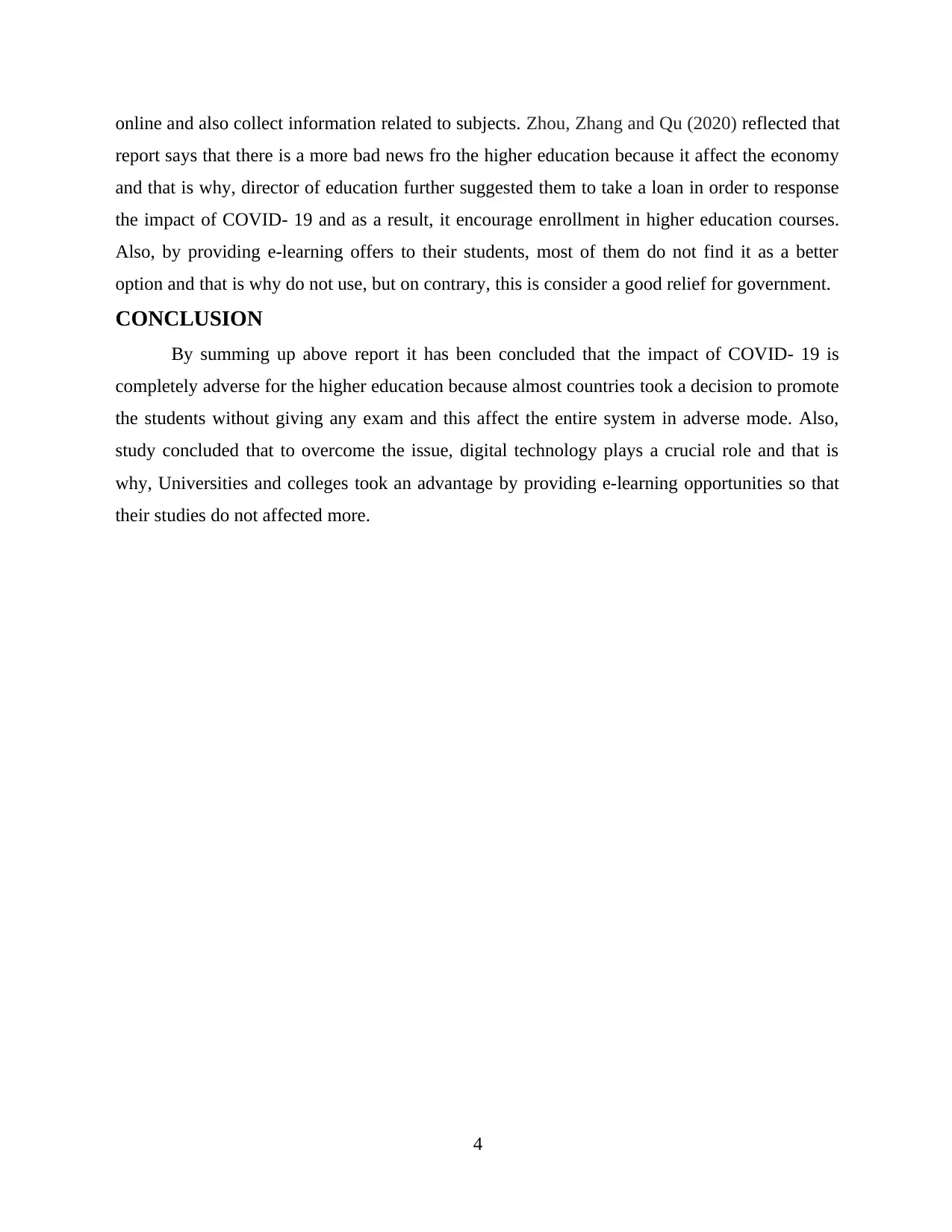
online and also collect information related to subjects. Zhou, Zhang and Qu (2020) reflected that
report says that there is a more bad news fro the higher education because it affect the economy
and that is why, director of education further suggested them to take a loan in order to response
the impact of COVID- 19 and as a result, it encourage enrollment in higher education courses.
Also, by providing e-learning offers to their students, most of them do not find it as a better
option and that is why do not use, but on contrary, this is consider a good relief for government.
CONCLUSION
By summing up above report it has been concluded that the impact of COVID- 19 is
completely adverse for the higher education because almost countries took a decision to promote
the students without giving any exam and this affect the entire system in adverse mode. Also,
study concluded that to overcome the issue, digital technology plays a crucial role and that is
why, Universities and colleges took an advantage by providing e-learning opportunities so that
their studies do not affected more.
4
report says that there is a more bad news fro the higher education because it affect the economy
and that is why, director of education further suggested them to take a loan in order to response
the impact of COVID- 19 and as a result, it encourage enrollment in higher education courses.
Also, by providing e-learning offers to their students, most of them do not find it as a better
option and that is why do not use, but on contrary, this is consider a good relief for government.
CONCLUSION
By summing up above report it has been concluded that the impact of COVID- 19 is
completely adverse for the higher education because almost countries took a decision to promote
the students without giving any exam and this affect the entire system in adverse mode. Also,
study concluded that to overcome the issue, digital technology plays a crucial role and that is
why, Universities and colleges took an advantage by providing e-learning opportunities so that
their studies do not affected more.
4
⊘ This is a preview!⊘
Do you want full access?
Subscribe today to unlock all pages.

Trusted by 1+ million students worldwide
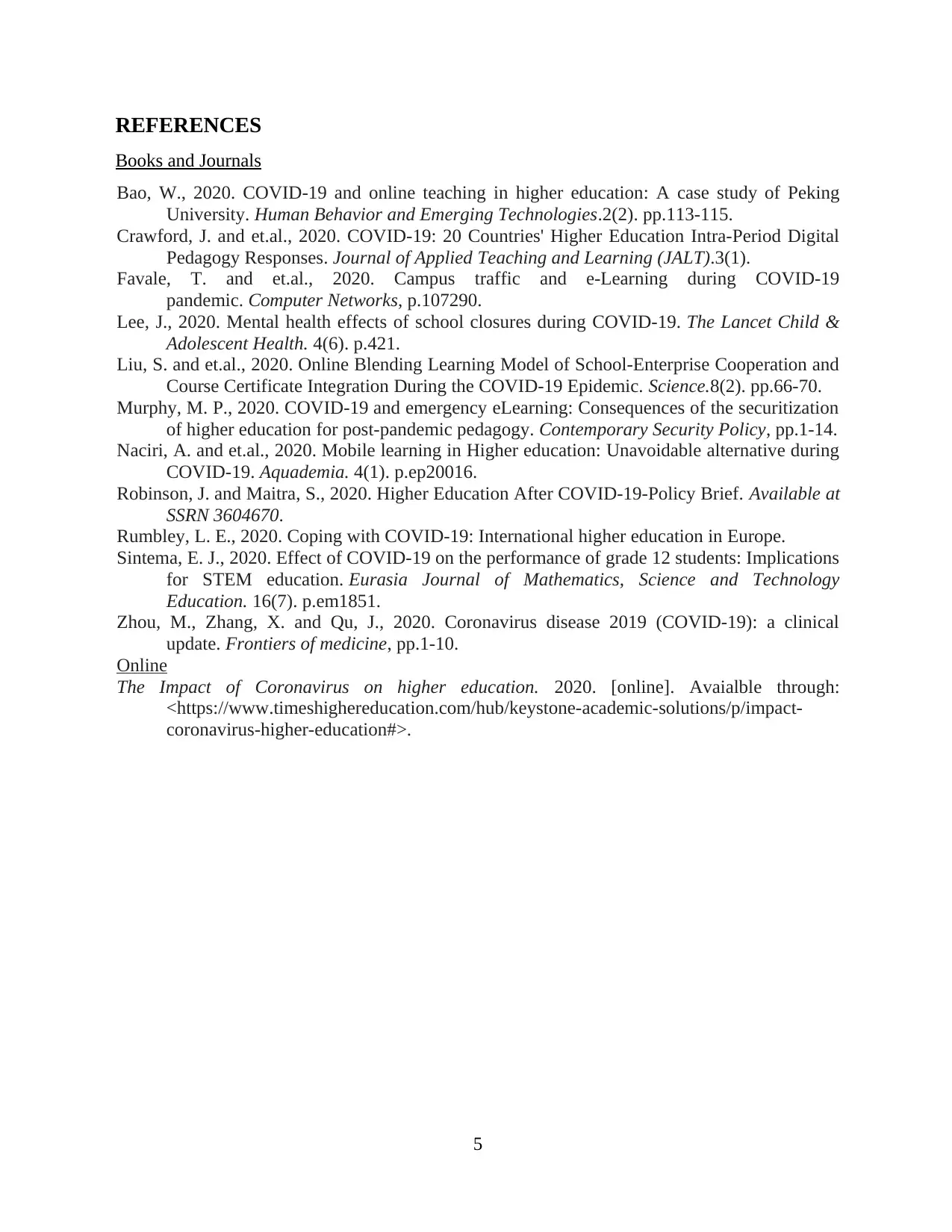
REFERENCES
Books and Journals
Bao, W., 2020. COVID‐19 and online teaching in higher education: A case study of Peking
University. Human Behavior and Emerging Technologies.2(2). pp.113-115.
Crawford, J. and et.al., 2020. COVID-19: 20 Countries' Higher Education Intra-Period Digital
Pedagogy Responses. Journal of Applied Teaching and Learning (JALT).3(1).
Favale, T. and et.al., 2020. Campus traffic and e-Learning during COVID-19
pandemic. Computer Networks, p.107290.
Lee, J., 2020. Mental health effects of school closures during COVID-19. The Lancet Child &
Adolescent Health. 4(6). p.421.
Liu, S. and et.al., 2020. Online Blending Learning Model of School-Enterprise Cooperation and
Course Certificate Integration During the COVID-19 Epidemic. Science.8(2). pp.66-70.
Murphy, M. P., 2020. COVID-19 and emergency eLearning: Consequences of the securitization
of higher education for post-pandemic pedagogy. Contemporary Security Policy, pp.1-14.
Naciri, A. and et.al., 2020. Mobile learning in Higher education: Unavoidable alternative during
COVID-19. Aquademia. 4(1). p.ep20016.
Robinson, J. and Maitra, S., 2020. Higher Education After COVID-19-Policy Brief. Available at
SSRN 3604670.
Rumbley, L. E., 2020. Coping with COVID-19: International higher education in Europe.
Sintema, E. J., 2020. Effect of COVID-19 on the performance of grade 12 students: Implications
for STEM education. Eurasia Journal of Mathematics, Science and Technology
Education. 16(7). p.em1851.
Zhou, M., Zhang, X. and Qu, J., 2020. Coronavirus disease 2019 (COVID-19): a clinical
update. Frontiers of medicine, pp.1-10.
Online
The Impact of Coronavirus on higher education. 2020. [online]. Avaialble through:
<https://www.timeshighereducation.com/hub/keystone-academic-solutions/p/impact-
coronavirus-higher-education#>.
5
Books and Journals
Bao, W., 2020. COVID‐19 and online teaching in higher education: A case study of Peking
University. Human Behavior and Emerging Technologies.2(2). pp.113-115.
Crawford, J. and et.al., 2020. COVID-19: 20 Countries' Higher Education Intra-Period Digital
Pedagogy Responses. Journal of Applied Teaching and Learning (JALT).3(1).
Favale, T. and et.al., 2020. Campus traffic and e-Learning during COVID-19
pandemic. Computer Networks, p.107290.
Lee, J., 2020. Mental health effects of school closures during COVID-19. The Lancet Child &
Adolescent Health. 4(6). p.421.
Liu, S. and et.al., 2020. Online Blending Learning Model of School-Enterprise Cooperation and
Course Certificate Integration During the COVID-19 Epidemic. Science.8(2). pp.66-70.
Murphy, M. P., 2020. COVID-19 and emergency eLearning: Consequences of the securitization
of higher education for post-pandemic pedagogy. Contemporary Security Policy, pp.1-14.
Naciri, A. and et.al., 2020. Mobile learning in Higher education: Unavoidable alternative during
COVID-19. Aquademia. 4(1). p.ep20016.
Robinson, J. and Maitra, S., 2020. Higher Education After COVID-19-Policy Brief. Available at
SSRN 3604670.
Rumbley, L. E., 2020. Coping with COVID-19: International higher education in Europe.
Sintema, E. J., 2020. Effect of COVID-19 on the performance of grade 12 students: Implications
for STEM education. Eurasia Journal of Mathematics, Science and Technology
Education. 16(7). p.em1851.
Zhou, M., Zhang, X. and Qu, J., 2020. Coronavirus disease 2019 (COVID-19): a clinical
update. Frontiers of medicine, pp.1-10.
Online
The Impact of Coronavirus on higher education. 2020. [online]. Avaialble through:
<https://www.timeshighereducation.com/hub/keystone-academic-solutions/p/impact-
coronavirus-higher-education#>.
5
1 out of 7
Related Documents
Your All-in-One AI-Powered Toolkit for Academic Success.
+13062052269
info@desklib.com
Available 24*7 on WhatsApp / Email
![[object Object]](/_next/static/media/star-bottom.7253800d.svg)
Unlock your academic potential
Copyright © 2020–2026 A2Z Services. All Rights Reserved. Developed and managed by ZUCOL.




